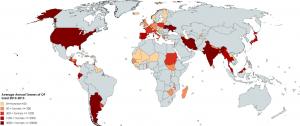New Research Calls for a Phase-Out of Organophosphate Pesticides
 Average annual tonnes of OP pesticides used in agriculture, by country, 2010–2015.
Average annual tonnes of OP pesticides used in agriculture, by country, 2010–2015.
Scientists are questioning the use of some pesticides, even at levels that have previously been considered safe. A team of researchers released a paper, published in PLOS Medicine, that reviews the impacts of organophosphate pesticides, such as chlorpyrifos, and finds multiple health risks associated with low-level exposure. These risks are especially concerning for children, as they can lead to issues such as reduced IQ, developmental delays and increased risk of learning disabilities. These concerns start before birth, as prenatal exposures also elevated risks for symptoms or diagnoses of attention-deficit/hyperactivity disorder (ADHD) and autism spectrum disorder (ASD).
The authors recommend that governments phase out the use of organophosphates and encourage the use of integrated pest management (IPM) strategies. They note that lessons can be learned from organic farming, which has developed strategies for overcoming on-farm challenges without the use of organophosphates. The authors also call for more education about the risks that organophosphates pose so that health professionals are more aware of, understand how to treat, and can provide information on how to prevent pesticide poisonings.


